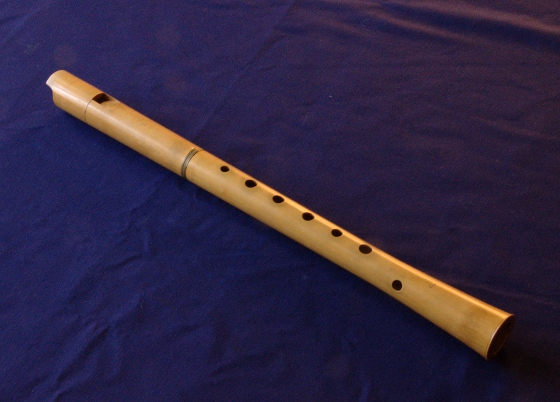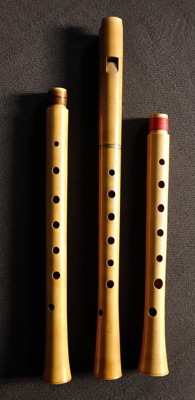PHILIPPE BOLTON
HANDMADE RECORDERS & FLAGEOLETS
"GANASSI" RECORDERS

Descant in D, Soprano in d, Alto in G, Alto in F, Tenor in D;, Tenor in C
The so called "Ganassi" recorder used today is not strictly speaking an early instrument,
but rather a modern idea freely based on the renaissance alto recorder in g n° SAM 135 in the
collection of the Kunsthistorisches Museum in Vienna, about which tecnical information, including its range and fingerings, can be found in the museum catalogue.
This original was probably not a solo instrument, but simply a part of a consort. It has a range of only an octave and a sixth, from g1 to e2, and the high note fingerings given
in La Fontegara cannot be used on it. There is more information on this recorder here.
On the other hand, the modern version above, which is somewhat different from the original, has a range of two and a half octaves with the
fingering system now known as "Ganassi fingerings", a compromise between the different charts in the Fontegara.
The Ganassi recorder may not be the most suitable instrument for playing
pre-baroque music, since none of the 17th century charts mention its fingerings, suggesting that its bore profile and resulting tone quality do not really suit music
of this period.
"Ganassi" soprano, alto in f and tenor recorders probably never existed in the past and should be considered as modern instruments.
Moreover, there may never have been any "solo" recorders during the Renaisance period.
This instrument could today be considered as a contemporary recorder. Sevaral composers of our time have written pieces for it.
For the 17th century repertoire, look up the transitional recorders.
|
Available pitches for Ganassi recorders:
440 Hz (all sizes) |

a 466 Hz "Ganassi" recorder with 2 extra lower joints |